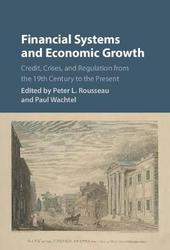
|
Financial Systems and Economic Growth: Credit, Crises, and Regulation from the 19th Century to the Present
Hardback
Main Details
| Title |
Financial Systems and Economic Growth: Credit, Crises, and Regulation from the 19th Century to the Present
|
| Authors and Contributors |
Edited by Peter L. Rousseau
|
|
Edited by Paul Wachtel
|
| Series | Studies in Macroeconomic History |
|---|
| Physical Properties |
| Format:Hardback | | Pages:308 | | Dimensions(mm): Height 236,Width 158 |
|
| Category/Genre | Economic history |
|---|
| ISBN/Barcode |
9781107141094
|
| Classifications | Dewey:330.9 |
|---|
| Audience | | Professional & Vocational | |
|---|
| Illustrations |
2 Halftones, black and white; 24 Line drawings, black and white
|
|
Publishing Details |
| Publisher |
Cambridge University Press
|
| Imprint |
Cambridge University Press
|
| Publication Date |
1 September 2017 |
| Publication Country |
United Kingdom
|
Description
Throughout much of the twentieth century, economists paid little heed to the role of financial intermediaries in procuring a beneficial allocation of capital. By the end of the century, however, some financial historians had begun to turn the tide, and the phrase 'finance-growth nexus' became part of the lexicon of modern economics. Recent experience has added another dimension in that countries with broader, deeper and more active financial systems might be prone to financial crises, particularly if regulatory structures are inadequate. In this book, Peter L. Rousseau and Paul Wachtel have gathered together some of today's most distinguished financial historians to examine this finance-growth nexus from both historical and modern perspectives. Some essays examine the nexus in a particular historical or cross-country context. Others, in the light of recent experience, explore the expanded nexus of finance, growth, crises, and regulation.
Author Biography
Peter L. Rousseau is Professor of Economics at Vanderbilt University, Tennessee and secretary-treasurer of the American Economic Association. He is a macroeconomist and economic historian who studies the role of financial markets and institutions in growth and development. He has published extensively in leading economic journals, including the Journal of Political Economy, the Journal of Monetary Economics, the Journal of Financial Economics and the Journal of Economic History. Paul Wachtel is Professor of Economics at New York University's Stern School of Business. He has published extensively on macroeconomics, monetary policy, and central banking. He is the co-editor of Comparative Economic Studies and a consultant to the Central Bank of Croatia.
Reviews'What kind of financial system meets the needs the needs of the economy and how best to avoid excessive financialization and instability are pressing policy issues in the wake of the Great Recession and Global Financial Crisis. These are also issues on which historical evidence sheds valuable light, as the contributors to this fine volume make demonstrably clear. Not only scholars, but also policy makers and regulators, should pay heed to this book.' Barry Eichengreen, University of California, Berkley 'This is an important collection of new essays by leading economic and financial historians and economists. Covering a broad range of countries and time periods, they make an excellent and compelling case for the at times overlooked contribution of different types of financial developments to economic growth and change.' Stanley L. Engerman, University of Rochester 'In this book, some of the top financial historians in the world explain how the various parts of the complex American financial system evolved through past crises. In the process, eventually the financial system learned how to sustain economic growth. This time will not be different if their lessons from history are learned.' Larry D. Neal, University of Illinois, Urbana-Champaign
|